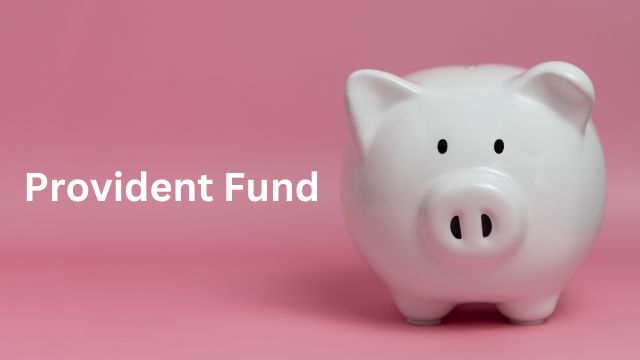Let’s say you have just got a job, and when you get your first salary, you see that in your salary slip, there is a deduction under the Provident Fund. You might feel a little confused about it first but know that it is actually for your own good. This whole provident fund thing is where the money gets deducted from your salary or maybe you pay it yourself, and you’ll get the compounded money with the interest when you retire. That’s pretty much the whole concept. After knowing this, you might be relieved about it, or for some of you, it might be a concerning thing, right? Well, worry not because if that’s the case then we are here to clear things up for you with today’s post where we will be taking a good look at the possible advantages and disadvantages of provident funds. So yeah, here we go.
Advantages Of Provident Fund
1. Financial Security in Retirement
So, you’re thinking about how you’ll manage money when you retire, right? That’s where Provident Funds jump in. They’re like your financial safety net for those golden years. Every bit you put in now grows over time, and before you know it, you’ve got a nice chunk of change waiting for you when you say goodbye to your job. It’s like having a backup for your daily costs and unexpected expenses, so you don’t have to lean on anyone else.
2. Who Doesn’t Love Tax Breaks?
Here’s another cool thing about Provident Funds, see, they’re pretty sweet when it comes to taxes. Most of the time, what you put into the fund can cut down your tax bill. And get this, the interest your money earns? Often, you don’t have to pay taxes on that either. So, you’re not just stashing away cash for later; you’re being a smart tax planner too.
3. Some Additional Perks
Here, we’re talking about things like loans for a new home or your kid’s college fees, insurance to have your back, and even support for your family if something unexpected happens to you. These perks make Provident Funds more than just a retirement stash; they’re a full-on financial toolkit, at least that’s what most financial pros or gurus say.
4. Safe and Steady Cash Deal
You know, Provident Funds are like this government thing that’s all about keeping your investment safe and steady. It’s like putting your money where you know it’ll grow without the crazy ups and downs of the market.
5. Bigger Returns, More Peace of Mind
Now, let’s talk about the money matters. Compared to other safe investment options out there, Provident Funds really stand out. Why? Because they generally hand out better returns. And yeah, with its mix-and-match nature, combining features of different investment types, it promises a certain payoff. That’s a big deal, especially if you’re the type who gets nervous with risky stuff. In such a case, you get higher returns without losing sleep over security.
Disadvantages Of Provident Fund
1. Can’t Touch Your Money Easily
You know how Provident Funds are, right? They’ve got these really strict rules about when you can take your money out. Basically, you can’t get your hands on your cash unless you’re retiring or haven’t had a job for a while. This can be a real headache, especially if you suddenly need money for an emergency or something urgent. While it’s great for saving up for the long term, it’s not so great if you need some of that money now, like right now. It’s kind of a bummer for folks who might need quick access to their savings.
2. Impact of Inflation
Inflation is like this sneaky thing that eats away the value of your money over time. When it comes to Provident Funds, which you’re saving up for the long run, inflation can really take a bite out of what your money’s worth. Imagine, the money you stash away today might not buy you as much stuff when you’re ready to retire because everything else gets more expensive. So, it’s super important to think about how much your Provident Fund might actually be worth down the road, and whether it can keep up with inflation and all.
3. Saving Without a Say
With Provident Funds, part of your salary gets automatically tucked away every month. This means you’ve got less money to spend on whatever you want or need right now. It’s like you’re forced to save, which can be a bit of a drag if you want to use that money for other stuff, like investing in different things. Sure, being forced to save is good for your future, but not everybody will like this stuff happening to them, especially if you like having more control over your cash and how you invest it.
4. Tricky Rules for Putting in and Taking Out Money
You know, with Provident Funds, there’s this thing about having limits on how much you can invest and really long times when you can’t touch your money. This can be a bit of a bother for folks who want more freedom in where they put their money or might need to get their hands on their cash before they hit retirement. The main headache is this lock-in period, which basically means you can’t take out your money for other big stuff in life that might need a lot of money down the road.
5. Ups and Downs in the Market
Alright, so Provident Funds are usually seen as pretty steady, but they’re not totally safe from the ups and downs of the market. The money these funds put into stuff like government IOUs and company loans has to dance to the tune of the market. So, what you get back from these funds can go up and down depending on things like how the economy’s doing. This bit is super important for those who like their investments to be more like a straight line, without surprises.
Conclusion
There you have it. Now, you must be feeling a lot clearer in your head about this whole provident fund thing, and how it actually works, right? Well, if you are still confused, we’d definitely tell you to seek professional advice, or you can dig a little deeper on your own, that would work too.
Topics You Might Also Like:
Anantha Nageswaran is the chief editor and writer at TheBusinessBlaze.com. He specialises in business, finance, insurance, loan investment topics. With a strong background in business-finance and a passion for demystifying complex concepts, Anantha brings a unique perspective to his writing.



